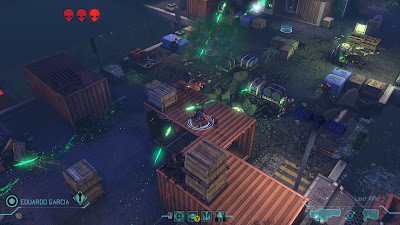My friends, readers of my blog, and even strangers with whom I've made accidental eye contact know how uncontrollably optimistic I've been about Assassin's Creed III, beginning with the moment I first saw the leaked box art. It was then that I learned the fifth major installment in Ubisoft's epic action-adventure franchise would take place during the American Revolution, that it would feature a bad-ass tomahawk-wielding Native American, and that it would likely allow me the unique opportunity to scamper around the rooftops of a colonial-era replica of my hometown city of Boston, using British Redcoats as foul-mouthed, tea-swilling archery targets.
However, the clever reader will have inferred from my earlier ramblings concerning "disappointment" that this optimism was... misplaced. So what went wrong? How did Assassin's Creed III make the transition from my Most Anticipated Game of 2012 to Biggest Letdown?
| Assassin's Creed III is beautiful, but unfortunately looks aren't everything. |
Let's start with the basics. Assassin's Creed III draws its foundation from the other games in the series, relying heavily on their well-established portfolio of game mechanics. As you step back into the Animus to re-live the adventures of yet another historical Assassin (this time it's Ratonhnhaké:ton, a.k.a. "Connor", Desmond's Revolutionary-War-era ancestor), you'll quickly find yourself climbing, sneaking, and murdering again like old times. In fact, you'll feel almost as though you were playing any other Assassin's Creed game... but unfortunately, the key word here is "almost". In its attempts to build upon the franchise's winning formula, Assassin's Creed III somehow manages to struggle with narrative and design elements that its predecessors handled with aplomb.
Here's an example: in past games, you could boost each mission's completion rating (and take on a bit of extra challenge) through certain "optional objectives", such as finishing the mission without being detected, or without taking more than a certain amount of damage. Although this feature reappears in Assassin's Creed III, this time it feels like an afterthought. One mission asked me to perform a certain number of "corner assassinations", though I'm quite certain I was never told what those were. Another mission told me I should tackle a man I was chasing from above, but even after about 20 tries, I couldn't convince Connor to heed my commands to do so. Instead, each time he stubbornly leaped onto one of the other guards nearby, to the extent that I really began to believe he was being deliberately and spitefully obtuse.
| Get used to killing Redcoats, because it's a hell of a lot easier than trying to sneak around without alerting them. |
This example may seem like garden-variety nitpicking, but Assassin's Creed III is packed with similarly frustrating cases of mechanics that are poorly implemented, totally lacking any sort of narrative context, and occasionally even downright broken. Whereas in past games your primary revenue stream was a sort of real estate side quest that integrated nicely with natural city exploration, now it's a crafting and trading system that takes place through an interface so tedious and clunky that I literally decided to just endure the entire game with a severe cash flow problem rather than suffer through it. Likewise, the revamped Assassin training missions are designed and motivated so badly it almost seems like they're actively trying to discourage you from playing them. And don't even get me started on the lockpicking mini-game, which couldn't have been more awkward if it had involved using a real pair of tweezers to take apart your Xbox Kinect.
While all these minor flaws conspire to kill Assassin's Creed III slowly via death by a thousand cuts, there are also some major flaws trying to shiv it directly in the kidneys. One notable failing is the stealth system, which one suspects would be a core game mechanic in a series based entirely around secretly killing people. In past games stealth has been handled pretty competently, but in Assassin's Creed III your adversaries seem to be hyper-aware, and hiding from them has become more difficult than ever. On several occasions I walked slowly and carefully by guards only to have them spring into "alert" status without warning, forcing me to run away like a little bitch with half the British army at my heels. (I typically led my pursuers halfway across the city while humming "Yakety Sax" to myself, before inevitably giving up on my attempts at evasive maneuvering and simply murdering everyone.) These issues made any part of the game with stealth components extremely frustrating, and any missions where stealth was mandatory downright infuriating.
| Apparently, Connor's primary role as a player character is to convince us that Desmond's vapid personality is a hereditary trait. |
At this point, I should probably comment on the plot. Rather than heap more criticisms upon a game that already has endured so many, let's first discuss some narrative aspects of Assassin's Creed III that I don't have a problem with. For instance, I don't have a problem with the bizarre sci-fi turn the series has taken, with its "ancient precursor civilization" (à la Mass Effect and Halo), a concept that will certainly go down as the Biggest Game Cliché of 2012. I don't have a problem with Desmond being such a central character, despite the fact that he's about as relatable as a wax statue of Keanu Reeves, and I don't care that Connor is even worse. I don't even have that much a problem with the ending, even though it totally blows.
What does bother me though, is that all of these elements were combined in such disarray, resulting in a plot so completely full of holes, that eventually it compelled me not to care why anyone did anything. Why does Connor become an Assassin? Why should I hunt and kill the Templars, and why should I help the American patriots? What is Connor hoping to achieve? The answers to these questions were usually poorly explained, lacking completely, or they happened well after I'd spent hours completing relevant missions with virtually no context. At one point, Connor became angry at another character for executing a captured enemy... as though I hadn't just spent 25 hours murdering every person in a red coat and a funny hat I ran into just for the hell of it. When your protagonist manages to convince you that he's so oblivious that you shouldn't care what happens to him anymore, that's not a good sign.
| The worst part is, killing Redcoats with a tomahawk really is a ton of fun. |
If it seems like I'm being too hard on Assassin's Creed III, it's only because it had so much promise, and because at times it even manages to actualize its potential. Visually, the game is absolutely stunning, and the environments have a wonderfully immersive feel, from the lively mercantile docks of colonial Boston, to the burnt-out buildings of New York after the Great Fire, to the tranquil beauty of the New England forests. Moving through these rich historical worlds is especially enjoyable because of the incredible quality of the character animations, as Connor free-climbs cliffs and leaps through treetops with such fluidity and grace it makes the ninjas from Crouching Tiger, Hidden Dragon look like a pair of drunken lemurs. Similarly impressive are the naval battle side quests, which are fun to play and do justice to the epic scale of the Revolutionary War setting. Even the fractured plot has its moments; for example, one of my favorite scenes in the game was a death monologue so well-written that it incorporated the word "tittie", while still managing to be one of the most profound bits of video-game writing I've encountered.
In closing, I've probably been more critical of Assassin's Creed III than it deserves, though in my defense, the game misses a bar that it largely set for itself. With the high quality of previous titles in the series and the immense potential offered by its epic setting, Assassin's Creed III had some big shoes to fill, and it certainly wasn't up to the task. If you've never played an Assassin's Creed game before, then you might not be as disappointed as I was... but if that's truly the case, do yourself a favor and play Assassin's Creed II or Assassin's Creed: Brotherhood instead.
























